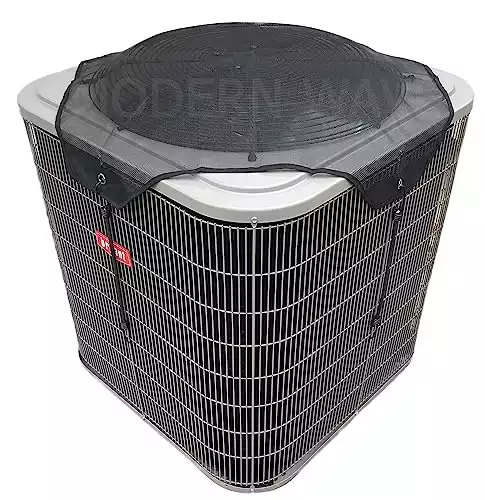When winter is approaching, most homeowners go through their routine of getting everything ready for the changing seasons.
One thing that many people overlook is their AC unit outside.
Some folks say that you should cover your AC unit for the winter. But is that really necessary?
Here’s the truth:
You should not cover your outside AC unit during the winter unless it is at risk from falling debris. AC units are designed to withstand the winter climate as long as they do not run. Covering your AC unit outside may cause it to hold moisture and rust. It could also cause animals to nest in your AC unit.
In this article, I’ll go over why it’s usually not necessary to cover your AC in the winter.
I’ll also discuss when it’s appropriate to cover your AC and the best way to cover your AC if you need to.
Why you don’t need to cover your AC in the winter
Even though it seems like a good choice, there’s not much to gain from covering your AC in the winter.
Modern AC units are designed to withstand low winter temperatures.
It won’t hurt the AC unit to get snowed or rained on either.
In fact, putting a cover over your AC unit may actually cause damage.
Leaves and moisture can get trapped inside a covered AC and cause its internal components to rust.
Besides corrosion, you also need to look out for critters. Rodents like to nest inside the cozy shelter of a covered AC unit.
How to know if you need to cover your AC
The case around your AC unit serves to protect its internal components from physical damage. However, if the case takes too much damage, then the inner workings of the AC will be at risk.
The only situation in which I recommend covering your AC is if it will be exposed to falling debris such as:
- Leaves
- Branches
- Ice
If your AC unit has trees above or near it, then covering it is actually a good idea.
While seemingly innocuous, debris such as leaves and small sticks can become trapped inside your AC. As the leaves decay, they may promote corrosion inside your AC.
Another thing to look out for is heavy falling objects such as tree branches and ice. Even though your AC has a protective case around it, your AC may get damaged if a branch or icicle falls on it.
How to protect your AC in the winter
If you think that your AC unit will get damaged by falling ice, branches, or other debris, then you should put a piece of plywood on top of it.
The plywood provides a protective barrier to take impacts during the fall and winter. That way your AC unit won’t be in the direct line of damage from falling tree limbs and ice.
I recommend using a piece of plywood instead of a full cover because of these reasons:
- The plywood won’t trap moisture in the AC unit
- The plywood won’t provide a comfy shelter for rodents
- The plywood will prevent falling debris from damaging your AC or getting inside of it
If you end up using a piece of plywood to cover your AC, then make sure that the plywood is slightly larger than the top of your AC. If the plywood is slightly larger, then water will drain off the side of the plywood and won’t touch your AC.
Also, be sure to put a brick or heavy object on the plywood to keep it weighed down. You don’t want a gust to wind to blow the plywood off your AC in the middle of winter.
If you only need to keep leaves and small debris out of your AC unit, then you can use a purpose-made AC cover. I recommend getting a mesh cover that is non-waterproof.
The reason that I recommend getting a non-waterproof cover is that it won’t collect water on top of it. Look for a mesh cover that is breathable.
Here’s a non-waterproof mesh AC cover that I recommend:
This AC cover is made of a breathable mesh so it won't trap moisture inside your unit. Great for keeping small debris such as leaves and sticks out of your AC during the fall and winter.
Quick tip: This cover comes in 3 sizes, so be sure to choose the correct one for your unit.
What’s so bad about using a waterproof AC cover?
Waterproof AC covers are good in theory, but they often cause more problems than they are worth.
Water can sometimes pool up on the top of waterproof covers, causing a nasty mess.
Another issue with waterproof covers is that they can trap water in between the cover and AC unit, promoting rust and mildew.




